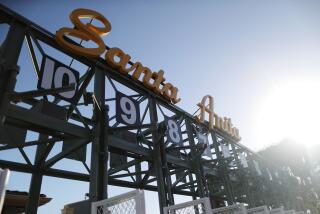Governor OKs Bill Giving Del Mar Off-Track Betting
Racing fans will be able to make bets at the Del Mar race track for other Southern California tracks and for big-money races such as the Kentucky Derby under a satellite betting bill signed by Gov. George Deukmejian.
The Del Mar track hopes to have large-screen televisions and betting windows ready for the Nov. 18 start of racing at Hollywood Park.
A two-story satellite betting facility, complete with dining rooms and space enough for 3,500 gamblers, is being designed and could open within a year.
The bill, authored by State Sen. Ken Maddy (R-Fresno), authorizes satellite betting at tracks and county fairgrounds throughout Southern California, and is modeled after operations already under way in Northern California.
A companion bill, authored by Assemblywoman Sunny Mojonnier, (R-Encinitas), could also make it easier for harness racing to return to Del Mar, although there are no current plans for such racing. Both bills were signed Monday night by the governor.
Under the two-way satellite system, racing fans from Los Angeles, who make up 40% of Del Mar’s patronage, will be able to make bets for Del Mar’s 43-day season at their local tracks.
No Need for Trek
On the other hand, San Diego County racing fans will no longer need to trek north to Hollywood Park, Santa Anita and Los Alamitos, or cross the Mexican border to partake of the foreign book at the Caliente race track in Tijuana. The last could be particularly hard hit.
Joseph Harper, general manager of the Del Mar Thoroughbred Club, estimated that the daily handle from satellite betting for Del Mar races will be from $2 million to $2.5 million. The daily handle was $3.8 million for the recent season.
For fans, a higher daily handle will mean bigger purses and therefore potentially better and more exciting horses.
The satellite betting, in some measure, will compensate for an inevitable drop in betting at the track, and a loss of parking and concession revenue. One study suggested that on-site betting could drop by a third, so satellite betting is not all gravy.
“The experience in New York with off-track betting was that Belmont and Aqueduct, the older tracks, had a significant drop in attendance, but Saratoga, a nice track in Upstate New York, did not,” said Harper.
“We hope Del Mar will have a Saratoga experience,” he said. “Del Mar is still a wonderful place to visit for a short smog-free vacation near the ocean. We may miss some of the Los Angeles people (who are) no longer willing to drive four hours to place a bet.”
Under the satellite system, some out-of-state races will also be available for betting, including the famed Triple Crown races.
Those races will be available via satellite to the extent that they are now part of the pari-mutuel operation at Southern California tracks. The Los Angeles tracks have their own pari-mutuel for several big-time races, which will now be available in Del Mar.
Additional Income
Roger Vitaich, general manager of the Del Mar Fair Board, said additional income from satellite betting will be used to pay for the $60-million construction of a new 15,000-seat grandstand for the fairgrounds and race track.
Planning for the satellite betting facility began three weeks ago, in anticipation of the governor signing the bill, he added.
“We’re looking at a whole new way of providing recreation on state land, which is what we’re supposed to do,” Vitaich said. “I see no reason why this cannot be expanded so in a few years you can come to Del Mar and place a bet on a soccer game in Dublin.”
The satellite betting facility is planned for the eastern portion of the track grounds between the track and Jimmy Durante Boulevard. During the Del Mar season, no satellite betting for other tracks will be available at Del Mar, Vitaich said.
As for Mojonnier’s bill, Vitaich said he does not foresee harness racing returning soon to Del Mar. Specifically, the bill repeals a law requiring that harness racing seasons have at least five days of racing per week.
For six years, Del Mar has been without harness racing. Owners said the five-day rule overtaxed the horses and exhausted the market, making it unprofitable.
Vitaich said that Allan Horowitz, an official with the Western Standardbred Assn., which conducts harness racing, told him that no plans currently exist to propose harness racing at Del Mar.
The “enabling” legislation, Vitaich said, is simply meant to allow a proposal at an indefinite time in the future.
Caliente May Lose
The loser in the Maddy bill will most probably be the Caliente track, which has its own racing season but also offers a popular foreign book, so fans can bet tracks throughout the United States and abroad. The Caliente book, however, will continue to include many races outside California that will not be available in the satellite system.
The operator of the Caliente track was reportedly in Mexico City and unavailable for comment Tuesday.
Maddy has estimated that his bill will increase horse race betting by $350 million a year, bringing $1 million to the state treasury and $10 million for the improvement of fairgrounds throughout Southern California.
The bill was the product of intense negotiations between various track operators and officials of the California Horse Racing Board. At issue were complex details about the split between various tracks and how facilities would be built and regulated.
One state official familiar with the negotiations noted that “in California only water politics are more complex than horse racing politics.”
More to Read
Go beyond the scoreboard
Get the latest on L.A.'s teams in the daily Sports Report newsletter.
You may occasionally receive promotional content from the Los Angeles Times.










